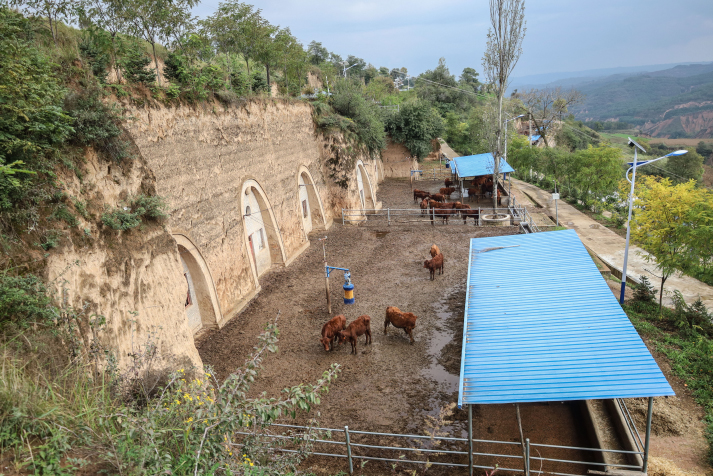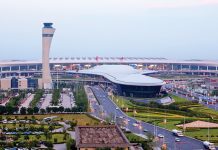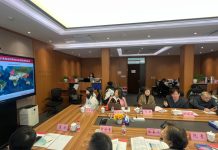
With an altitude of 890-2,857 meters, Pingliang is located in the hill and canyon area of the Loess Plateau, with its natural scenery comprising rivers, valleys, mountains, plains and tablelands.
Pingliang’s geographical location may give it a vast and beautiful landscape, but its economy is not nearly as developed as that of the eastern coastal cities.
However, the measure of a society’s development level is not only how rich it is or how advanced its technology is, but also the status and situation of its elderly, children and disabled.

And from the perspective of inclusive development, Pingliang has a high level of social progress.
Twists and turns
Zhang Qiheng lives in the West Street Community in Pingliang’s Chongxin County. An accidental fall in 1984 left him wheelchair-bound and completely dependent on his father for his daily needs. Their main income came from a small stall at the local farmers market, but they also relied on the local government’s subsistence allowance to make ends meet.
But after his father passed away last year, Zhang’s life fell apart.
Unable to maintain the small stand on his own, and with his only source of income having disappeared, he was left with nothing to live on but what the government gave.
Fortunately, his plight was brought to the attention of the county government that same year. The authorities then helped Zhang rebuild his small stall business. “The income is still low, but I get by. What’s important is that there’s work to do and people to meet,” Zhang told Beijing Review.
But the authorities’ efforts didn’t stop there. The county government has also set up a daycare project for people with severe disabilities. In 2022, the authorities decided to transform the County Rehabilitation Center for the Disabled into a daycare and nursing facility for all eligible people with disabilities.
The Chongxin County Disabled Persons’ Federation conducts home visits to find people in need and understand their situation. After verifying that they qualify, federation staff then sign an agreement with the eligible beneficiaries based on their individual willingness to participate.
“Every morning, from Monday to Friday, someone comes to pick me up and takes me to the nursing home, where I have my own bed and can watch television. There are also specialized staff who take care of my meals and help me with my rehabilitation exercises,” Zhang said, adding, “I have even made some friends in the nursing home. We talk and sometimes play board games. It’s starting to feel like home.”
Today, Zhang lives every day to the fullest, spending Monday through Friday at the nursing home and going to the farmers market on weekends.
When the county government renovated old residential areas earlier this year, it included Zhang’s neighborhood, making the entrance to his building more wheelchair accessible. In addition, the living environment inside his apartment received an upgrade. His interior cabinets and kitchen accessories were made more convenient for his daily use in this year’s accessible remodeling project executed by the county disabled persons’ federation. “Now, it is much easier for me to move around in my kitchen and I can whip up a simple meal for myself. It (the interior makeover) has added more flavor to my life,” Zhang said.
Not one less
With a nine-year curriculum, Jingshan School, which opened in 2022, has changed the face of education in Pingliang’s Lingtai County, a place that once lacked high-quality educational resources.
To help students realize their potential, the school offers a variety of art club activities and technology workshops in addition to the basic curriculum. Since its inception, the school’s mission has remained the same: to ensure that no school-age child misses out on an education—for whatever reason. According to Chinese law, every child must receive nine years of compulsory education, from primary school to junior secondary school.
To protect the right of school-age children to education, Jingshan staff and teachers carefully read and compare the results of the Seventh National Census, conducted in 2020, with the enrollment list of school-age children provided by other schools in the county before the start of each semester.
They then find local school-age children who haven’t enrolled in school, visit the homes of these children to better assess and understand their difficulties, persuade them to go to school and offer them help.
Take the example of Xue Jingyi. The young girl was supposed to be in seventh grade this year, but missed a lot of school due to illness. After learning of her situation, Cao Xiujuan, Jingshan’s principal, discussed it with Xue’s teachers and they all agreed to visit her home every Friday to tutor her.
“It just hurts me to see that students that cannot come to school. So, we suggested to the school, in consultation with her parents, that the classroom be brought to her home,” Cao told Beijing Review. To help Xue adapt, her teachers prepared a special lesson plan, which was consistent with the girl’s previous learning foundation.
With the carefully prepared lesson plan and one-on-one tutoring, Xue made rapid progress. “Although it takes up a lot of free time, the smile on Xue’s face gives me a sense of fulfillment. It’s all worth it,” Cao added.
Then there’s the case of Zhao Jie, a seventh-grade student with a tendency to not come to class due to family reasons. Thanks to the persistence and insistence of Jingshan School, he eventually decided to give school another go.
“The teachers come to my home every week. They take care of my studies as well as my daily life. Once, after seeing me hunching over my bed doing homework, they brought me a new desk the following day,” Zhao said.
“In addition to the desk, I’ve also received a lot of daily necessities and school supplies, and even a living allowance. How can I be a quitter after getting all this? Now I just want to study hard, go to high school and then university. And maybe one day I will be able to help kids like me,” he said. –The Daily Mail-Beijing Review news exchange item





